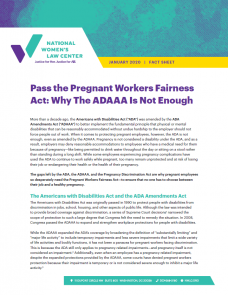Abortion rights, women of color, and LGBTQIA+ people are under attack. Pledge to join us in fighting for gender justice.
 More than a decade ago, the Americans with Disabilities Act (“ADA”) was amended by the ADA Amendments Act (“ADAAA”) to better implement the fundamental principle that physical or mental disabilities that can be reasonably accommodated without undue hardship to the employer should not force people out of work. When it comes to protecting pregnant employees, however, the ADA is not enough, even as amended by the ADAAA. Pregnancy is not considered a disability under the ADA, and as a result, employers may deny reasonable accommodations to employees who have a medical need for them because of pregnancy—like being permitted to drink water throughout the day or sitting on a stool rather than standing during a long shift. While some employees experiencing pregnancy complications have used the ADA to continue to work safely while pregnant, too many remain unprotected and at risk of losing their job or endangering their health or the health of their pregnancy.
More than a decade ago, the Americans with Disabilities Act (“ADA”) was amended by the ADA Amendments Act (“ADAAA”) to better implement the fundamental principle that physical or mental disabilities that can be reasonably accommodated without undue hardship to the employer should not force people out of work. When it comes to protecting pregnant employees, however, the ADA is not enough, even as amended by the ADAAA. Pregnancy is not considered a disability under the ADA, and as a result, employers may deny reasonable accommodations to employees who have a medical need for them because of pregnancy—like being permitted to drink water throughout the day or sitting on a stool rather than standing during a long shift. While some employees experiencing pregnancy complications have used the ADA to continue to work safely while pregnant, too many remain unprotected and at risk of losing their job or endangering their health or the health of their pregnancy.
The gaps left by the ADA, the ADAAA, and the Pregnancy Discrimination Act are why pregnant employees so desperately need the Pregnant Workers Fairness Act—to ensure that no one has to choose between their job and a healthy pregnancy.
